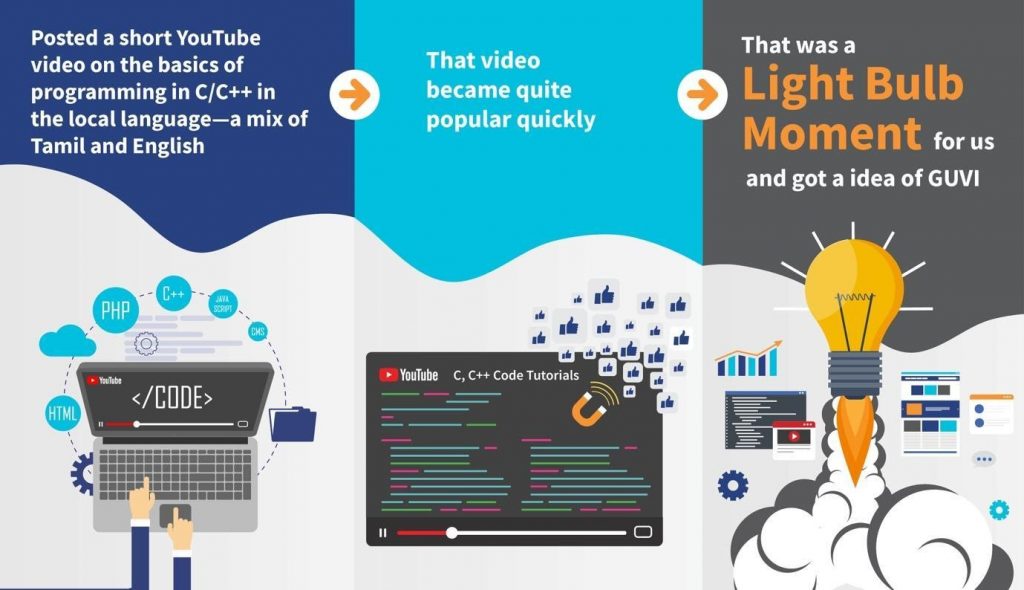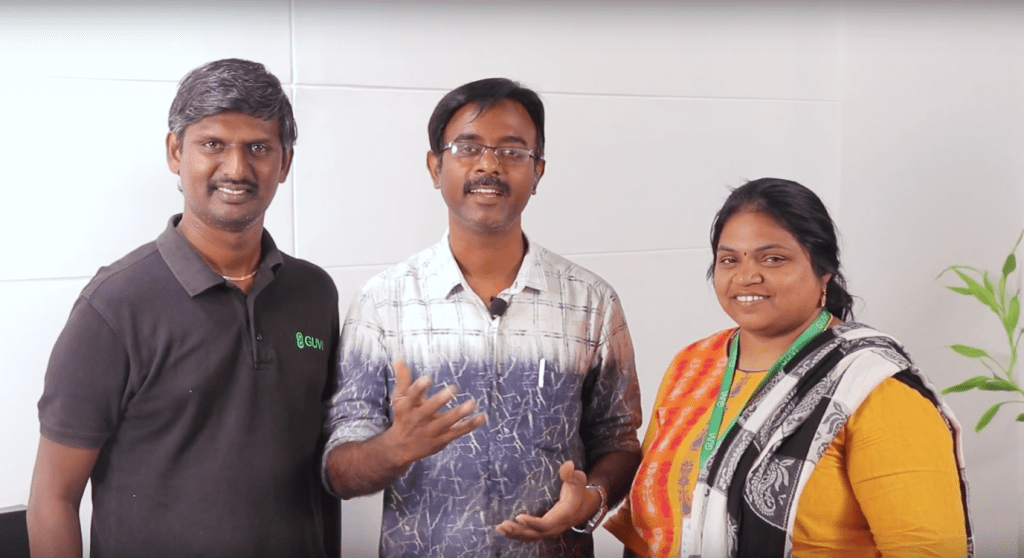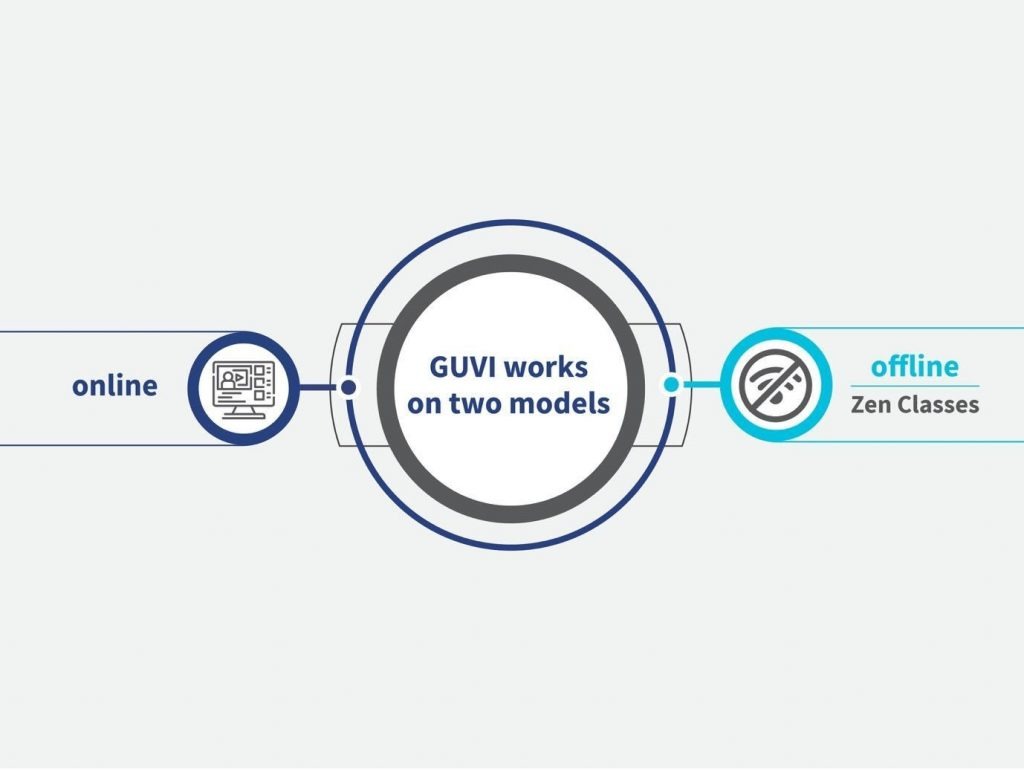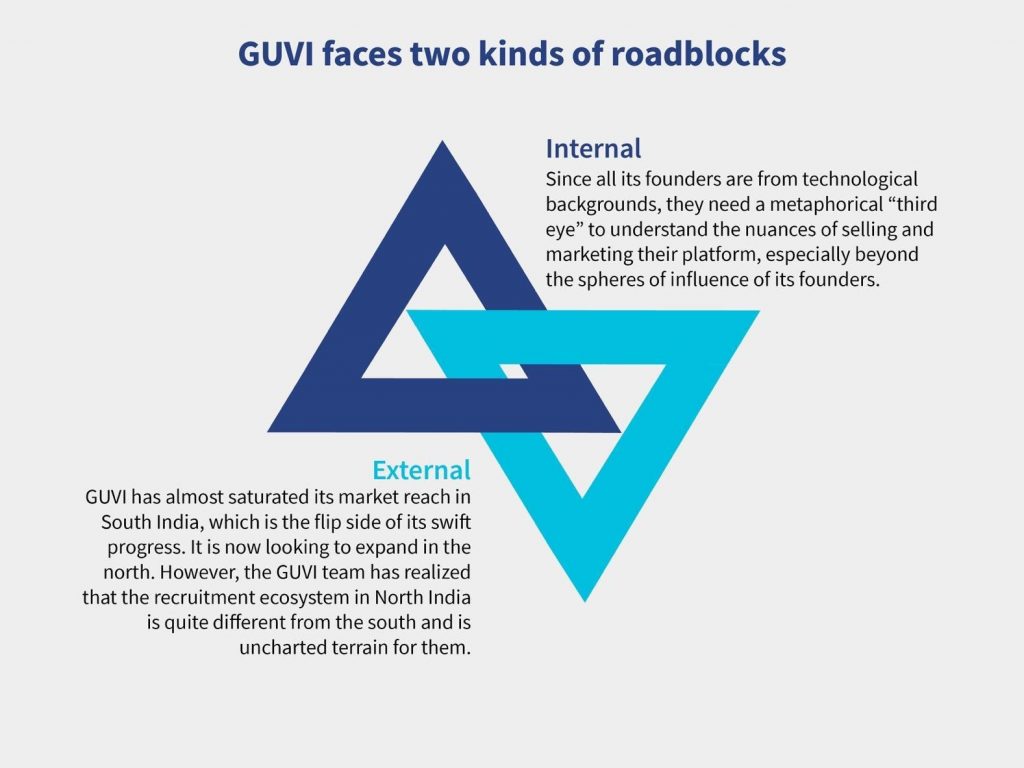GUVI: Bridging the language divide in learning technical skills

This blog tells about an Edutech that is bridging the gap between skills and job readiness of India’s IT graduates from remote towns. The story also uncovers how GUVI has been navigating successfully through the COVID-19 crisis.
The light bulb moment
Approximately 80% of computers, electronics, or allied engineering graduates are not fit to hire. Hence, it comes as no surprise that 73% of the recruiters are not able to secure the talent they require.

GUVI is an integrated EduTech platform that provides technical skills in local languages with end-to-end personalized support throughout the process of learning to recruitment. Arun Prakash, S.P. Balamurugan, and Sridevi founded the platform. While working together at PayPal, they observed a huge gap in the technological skills of fresh graduates in India, especially in computer programming. According to recent reports.
What started in 2014 as a YouTube channel to share technical knowledge has rapidly evolved into one of the biggest online EduTech platforms in South India.
“I remember posting a short YouTube video on the basics of programming in C/C++ in the local language-a mix of Tamil and English. That video became quite popular quickly!” Arun, the co-founder of GUVI, noted in one of the boot camp events of the Financial Inclusion (FI) lab.
“That was a light bulb moment for us. We suddenly realized the huge opportunity to bridge this skilling gap through the creation of an integrated learning and recruitment platform to cater to the talented but unskilled technical graduates from tier II and III cities,” he continued.

Figure 1: The co-founders of GUVI- Arun Prakash, SP Balamurgan, and Sridevi (L-R)
The unique pitch
GUVI’s mission is to make skilling an easy, simple, and intuitive process by bridging the gap between skilling and recruitment. On this platform, students can learn in their local languages through bite-sized videos, practice coding, test their skills, and compare their progress against their peers. GUVI attempts to make learning fun for its students through a gamified platform to practice coding, which awards “merit badges” to students who complete a course successfully. It also conducts periodic assessments and coding contests and rewards the top performers. The entire learning history of a student is maintained as part of their GUVI profile, which they can share with potential and current employers.
GUVI works on two models-an online learning platform that has been described briefly in the “unique pitch” section and an offline model that includes zen classes, which is a special classroom coaching model. As part of zen classes, GUVI handpicks students, trains them through industry experts, and finally places them with potential recruiters. Thus far, GUVI has been able to secure placements for all of its four zen class batches.
Skilling learners in the times of Covid-19
That Guvi’s model is relevant and popular with learners can be gauged by the fact that as on date (26 th April, 2020), 62,000 new learners have joined the platform to upskill themselves since India went into a country-wide lockdown on 21st March, 2020. This led to a significant jump from 250,000 to 312,000 learners that are now registered on Guvi’s platform since the pre-lockdown period. Now on an average, a learner spends 20 times more learning hours per week compared to the time they spent during the pre-March 2020 period. Testament to its success is the fact that GUVI raised in April 2020 INR 6 crore in a pre-series A round of funding from Education Catalyst Fund.

Impact on the LMI segment
In India, students from tier II and III cities face the following challenges:
- They are not exposed to quality technical education in schools and colleges because quality instructors in this domain are usually found in tier I cities where they are paid better
- They struggle to read, understand, and write in English, which is the common medium of teaching technical courses and coding languages.
Unable to overcome these challenges, such students find it difficult to acquire the requisite skills to attain appropriate jobs.
GUVI, through its low-priced, local language platform and on-demand, simplified computer programming courses, has up-skilled more than 150,000 students, mostly from the LMI segment, and helped them be recruited in respectable technology firms.
The roadblocks

Support provided by the Financial Inclusion lab
GUVI was selected for the Financial Inclusion Lab in its second cohort in March 2019, as part of which the start-up went through boot camps, diagnostic sessions, and clinic sessions with that provided bespoke technical assistance to achieve the following objectives:
- Understand the nuances of the fresher recruitment ecosystem of North India. This also included opportunities and market sizing of the business opportunities of GUVI with small, medium, and large technology enterprises and training and placement consultancies;
- Develop a cost-effective go-to-market (GTM) strategy by identifying the product-market fit for GUVI from among the technology and placement companies explored earlier; and
- Identify any overlooked skills to help GUVI differentiate itself from its competitors.
While the support of the Financial inclusion Lab continues, GUVI has already been able to achieve the following milestones:
- Partnerships with its most relevant enterprise segment-small and medium-sized technology firms in the north;
- Involved in strategic partnership discussions with prestigious IT industry associations such as NASSCOM, which has a pan-India presence and influence; and
- Built and incorporated soft-skill training modules in its platform to augment the employability of its trainees.
As a result, GUVI witnessed an improvement in the number of recruiters who joined its platform alongside an increase in the success rate of placement of its students or trainees, both in North and South India.
Skilling learners in the times of Covid-19
GUVI has become more relevant and popular for learners. Now, a learner spends, on an average, 20 times more hours per week as compared to time spent during the pre-March 2020 period.
Witnessing the immense success in terms of the number of learners on the platform, GUVI has also re-invented it’s B2B2C business model, in which it offers its courses and platform to engineering colleges completely online, due to broader market situation. GUVI has also proactively moved its Zen classes, one of the most popular and successful ones, completely online because of the lockdown and social distancing norms.
GUVI firmly believes that they can overcome the barriers of the background, region, situation, or financial status to skill any willing learner.
Originally published as a blog by MicroSave Consulting as part of the Bharat Inclusion Initiative.
